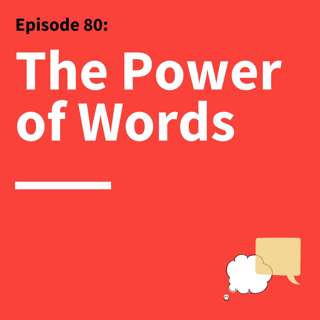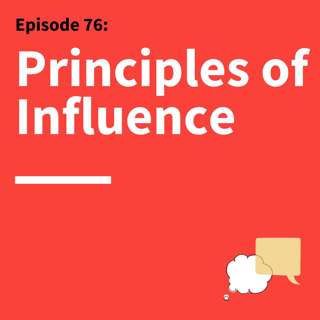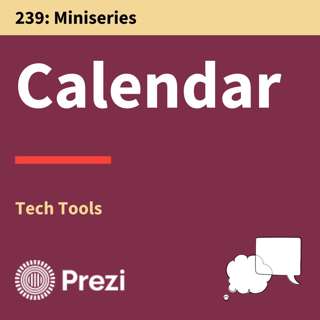
82. It’s Not About You: Why Effective Communicators Put Others First
It’s easy to feel like the star of the show when giving a presentation. But according to communication guru Nancy Duarte, you’re not the hero of this story.For Duarte, founder and CEO of world-renowned communication consulting firm Duarte Inc, effective communication is built on the foundation of empathy, which means considering your audience first and foremost. “All the attention is on us. But in reality, the audience is the one,” she says. “If they don’t leave with your idea adopted, your idea is going to die.”How can presenters use empathy to put their audience at center stage? As Duarte discusses with host Matt Abrahams in this episode of Think Fast, Talk Smart, it’s about seeking to understand before you start speaking.Connect:Premium Signup >>>> Think Fast Talk Smart PremiumEmail Questions & Feedback >>> hello@fastersmarter.ioEpisode Transcripts >>> Think Fast Talk Smart WebsiteNewsletter Signup + English Language Learning >>> FasterSmarter.ioThink Fast Talk Smart >>> LinkedIn, Instagram, YouTubeMatt Abrahams >>> LinkedIn ********This episode is sponsored by Grammarly. Let Grammarly take the busywork off your plate so you can focus on high-impact work. Download Grammarly for free today
21 Mar 202324min

81. Fact or Fiction? How to Communicate When We Hold Different Beliefs
Why does disagreement feel so personal? According to author, journalist, and physician Seema Yasmin, it’s because beliefs aren’t just about what we think, they’re about who we are.“What [people] believe is entrenched in them, and it’s to do with their sense of belonging and their sense of identity,” says Yasmin. Whether we’re butting heads over something trivial like sports or something major like COVID-19 vaccines, Yasmin points out that the disagreement is just the surface — underneath are complex layers of geopolitics, history, language, dialect, culture, faith, family history, and power hierarchies.So how do we show compassion to others, especially when we disagree with them? Yasmin and host Matt Abrahams explore strategies for more empathetic communication in this episode of Think Fast, Talk Smart.Connect:Premium Signup >>>> Think Fast Talk Smart PremiumEmail Questions & Feedback >>> hello@fastersmarter.ioEpisode Transcripts >>> Think Fast Talk Smart WebsiteNewsletter Signup + English Language Learning >>> FasterSmarter.ioThink Fast Talk Smart >>> LinkedIn, Instagram, YouTubeMatt Abrahams >>> LinkedIn ********This episode is sponsored by Grammarly. Let Grammarly take the busywork off your plate so you can focus on high-impact work. Download Grammarly for free today
14 Mar 202324min

80. Magic Words: Change What You Say to Inspire and Influence Others
Words have impact. But when it comes to enchanting audiences and captivating with communication, Jonah Berger, PhD ’07, says some words are more potent than others.Berger is a Wharton School professor and an internationally bestselling author. His most recent book, Magic Words: What to Say to Get Your Way, identifies language we can use to communicate more effectively in all sorts of personal and professional contexts. “Subtle shifts in language can have a huge impact on everything from convincing clients and holding attention to connecting with loved ones in our lives,” Berger says.Magic words allow us to change minds, engage audiences, and drive action. In this episode of Think Fast, Talk Smart, Berger and host Matt Abrahams discuss how we can leverage their power in our own communication.Connect:Premium Signup >>>> Think Fast Talk Smart PremiumEmail Questions & Feedback >>> hello@fastersmarter.ioEpisode Transcripts >>> Think Fast Talk Smart WebsiteNewsletter Signup + English Language Learning >>> FasterSmarter.ioThink Fast Talk Smart >>> LinkedIn, Instagram, YouTubeMatt Abrahams >>> LinkedIn ********This episode is sponsored by Grammarly. Let Grammarly take the busywork off your plate so you can focus on high-impact work. Download Grammarly for free today
8 Mar 202330min

79. Equity by Design: How Diversity Ignites Creativity
If we want healthier companies, schools, and teams associate professor of organizational behavior Adina Sterling says investing in the health of marginalized groups “can have enormous spillover effects for everyone.”Sterling is an organizational theorist and economic sociologist whose research explores how human relationships affect organizations and markets. As she says, “The outcomes that individuals, groups, and organizations experience have to do with the social networks that they have.”In her class and lab, Equity by Design, Sterling explores the structural and cultural drivers of workplace inequality. In this episode of Think Fast Talk Smart, she and Matt Abrahams discuss how organizations can leverage social networks, DE&I efforts, and better communication to create better outcomes for individuals and the collective.Connect:Premium Signup >>>> Think Fast Talk Smart PremiumEmail Questions & Feedback >>> hello@fastersmarter.ioEpisode Transcripts >>> Think Fast Talk Smart WebsiteNewsletter Signup + English Language Learning >>> FasterSmarter.ioThink Fast Talk Smart >>> LinkedIn, Instagram, YouTubeMatt Abrahams >>> LinkedIn ********This episode is sponsored by Grammarly. Let Grammarly take the busywork off your plate so you can focus on high-impact work. Download Grammarly for free today
28 Feb 202327min

78. Three Guiding Principles for Successful Communication
To celebrate our 75th episode, we hosted a live "Ask Me Anything" event with Matt. In this global gathering, listeners called in with questions ranging from making a first impression and giving negative feedback to presenting virtually and the worst communication advice Matt's ever received. In addition to audience questions, Matt also shares a short lecture to outline his top three guiding principles when it comes to being a confidence speaker and leader. Connect:Premium Signup >>>> Think Fast Talk Smart PremiumEmail Questions & Feedback >>> hello@fastersmarter.ioEpisode Transcripts >>> Think Fast Talk Smart WebsiteNewsletter Signup + English Language Learning >>> FasterSmarter.ioThink Fast Talk Smart >>> LinkedIn, Instagram, YouTubeMatt Abrahams >>> LinkedIn ********This episode is sponsored by Grammarly. Let Grammarly take the busywork off your plate so you can focus on high-impact work. Download Grammarly for free today
14 Feb 202327min

77. Quick Thinks: AI Has Entered The Chat – A "Conversation" with ChatGPT
In this "Quick Thinks" episode, host Matt Abrahams interviews ChatGPT, an AI natural language processing chatbot, about its purpose, sources of information, ethical considerations, and the importance of human communication skills.To produce this episode, Matt typed his questions to ask ChatGPT, then recorded them in the studio. Producers then used Descript Overdub to "read" ChatGPT's responses.The purpose of ChatGPT is to provide informative and accurate responses to questions in natural language.ChatGPT uses vast amounts of text data from the internet to generate responses based on patterns it has seen in the data.It is important to critically evaluate ChatGPT's responses and not rely on them as the sole source of information.The ultimate responsibility for ensuring academic integrity and ethical behavior lies with the individuals using ChatGPT.Effective communication skills are still essential, even with the existence of ChatGPT, as it cannot replace the human interaction and emotional intelligence that comes with face-to-face communication.Connect:Premium Signup >>>> Think Fast Talk Smart PremiumEmail Questions & Feedback >>> hello@fastersmarter.ioEpisode Transcripts >>> Think Fast Talk Smart WebsiteNewsletter Signup + English Language Learning >>> FasterSmarter.ioThink Fast Talk Smart >>> LinkedIn, Instagram, YouTubeMatt Abrahams >>> LinkedIn ********Thank you to our sponsors. These partnerships support the ongoing production of the podcast, allowing us to bring it to you at no cost. Go to Quince.com/ThinkFast for free shipping on your order and 365-day returns. Join our Think Fast Talk Smart Learning Community and become the communicator you want to be.
7 Feb 202311min

Think Fast, Talk Smart: The Podcast | Season 4 Trailer
Join Matt Abrahams, a lecturer of strategic communication at Stanford GSB, as he sits down with experts from across campus to discuss public speaking anxiety, speaking off the cuff, nailing a Q&A, and more.Connect:Premium Signup >>>> Think Fast Talk Smart PremiumEmail Questions & Feedback >>> hello@fastersmarter.ioEpisode Transcripts >>> Think Fast Talk Smart WebsiteNewsletter Signup + English Language Learning >>> FasterSmarter.ioThink Fast Talk Smart >>> LinkedIn, Instagram, YouTubeMatt Abrahams >>> LinkedIn
1 Feb 20232min

76. Change My Mind: Using “Pre-suasion” to Influence Others
Want to change someone’s mind? First, explains Robert Cialdini, you have to change their framing.For Cialdini, the Regent's Professor Emeritus of Psychology and Marketing at Arizona State University, persuasion begins before we even deliver our pitch or presentation. Through what he calls “Pre-suasion,” communicators can prime audiences to receive messages in a specific way, simply by drawing their attention in specific directions. “It involves focusing people on—putting them in mind of—those motivators before they encounter [them] in the communicator’s message,” Cialdini says, “bringing people’s focus of attention onto something that is nested in the message…before that message is delivered, so they have been readied for the concept.”In this episode, Matt Abrahams and Cialdini talk about the motivating power of FOMO, getting better advice from others, and how your next wine purchase could be influenced by what music is playing in the shop.Episode Reference Links:Robert's books: Influence and Pre-SuasionConnect:Premium Signup >>>> Think Fast Talk Smart PremiumEmail Questions & Feedback >>> hello@fastersmarter.ioEpisode Transcripts >>> Think Fast Talk Smart WebsiteNewsletter Signup + English Language Learning >>> FasterSmarter.ioThink Fast Talk Smart >>> LinkedIn, Instagram, YouTubeMatt Abrahams >>> LinkedIn ********This episode is sponsored by Grammarly. Let Grammarly take the busywork off your plate so you can focus on high-impact work. Download Grammarly for free today
24 Jan 202330min






















